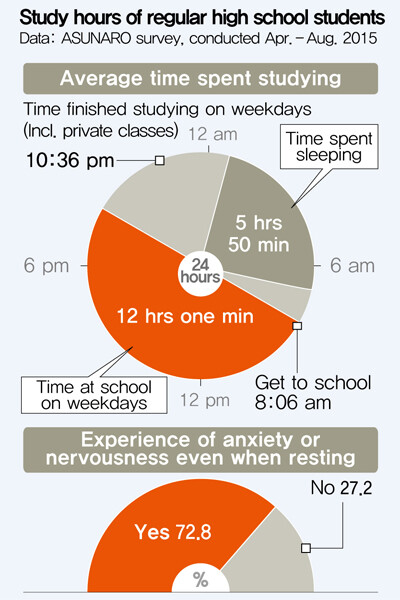hankyoreh
Links to other country sites 다른 나라 사이트 링크
If S. Korean students were workers, they’d be way into overtime

Jae-in (not his real name), 16, falls asleep at 1:30 am in the school dormitory since starting at his autonomous private high school in Seoul this year. Seemingly no sooner have his eyes closed than he is up again at 6:30 for another breathless day in school. Classes end at 4 pm, while supplementary classes continue on to 5 or 6 pm. After dinner comes compulsory free study until 11 pm. The late-night study sessions that go until one o’clock are nominally optional, but Jae-in never misses them.
“You see the other kids doing it,” he explained. “Then you get nervous and start thinking you need to study more.”
It‘s a daily routine familiar to students outside the autonomous private high schools as well. According to findings released on Aug. 26 from a survey of 6,261 elementary, middle, and high school students around the country by education and human rights groups, including ASUNARO: Action for Youth Rights of Korea and the Korean Teachers’ and Education Workers’ Union, students at regular high schools remain at school for an average over 12 hours each day. While regular high school students were found to leave at 8:08 pm on average, 41.3% reported leaving at 10 pm or later. Specialized high school students and middle school students reported staying for ten hours and four minutes and eight hours and three minutes, respectively.
“The total lawful working hours in the Republic of Korea are 52 hours a week, overtime included,” said ASUNARO member Gong Hyeon. “Even for middle school students, study times are approaching the longest working hours allowed by the law.”
ASUNARO, which launched a “school hour reduction project” last year, frets that the long study hours are giving rise to side effects as brutal as those from long working hours. A chief example is the infringement of health rights from lack of sleep. Survey respondents reported sleeping an average of six hours and 58 minutes a night. For regular high school students, the number dropped to five hours and 50 minutes; for specialized high school students, six hours and 14 minutes. A total of 82.7% of regular high school students reported “not getting enough sleeping hours.”
The emotional toll was similarly severe, with 85.6% of regular high school students reporting academic stress and 72.8% saying they had “experienced anxiety or nervousness even when resting.”
Schools have traditionally argued that compulsory supplemental classes and free study are meant to check the spread of private education. According to the survey results, it’s an effect that is not being achieved. No significant difference was found in private education rates for students attending and not attending on-campus study at the elementary, middle, and high school levels.
The groups said that South Korea needs the same kind of limits on study hours as exist for working hours and make a societal pledge to create suitable study hours and guarantee students‘ right to rest, to play, to pursue happiness, to receive an education, and to stay healthy.
By Um Ji-won, staff reporter
Please direct questions or comments to [english@hani.co.kr]

Editorial・opinion
![[Column] Samsung’s ‘lost decade’ and Lee Jae-yong’s mismatched chopsticks [Column] Samsung’s ‘lost decade’ and Lee Jae-yong’s mismatched chopsticks](https://flexible.img.hani.co.kr/flexible/normal/500/300/imgdb/original/2024/0512/3017154788490114.jpg) [Column] Samsung’s ‘lost decade’ and Lee Jae-yong’s mismatched chopsticks
[Column] Samsung’s ‘lost decade’ and Lee Jae-yong’s mismatched chopsticks![[Correspondent’s column] The real reason the US is worried about Chinese ‘overcapacity’ [Correspondent’s column] The real reason the US is worried about Chinese ‘overcapacity’](https://flexible.img.hani.co.kr/flexible/normal/500/300/imgdb/original/2024/0510/5217153290112576.jpg) [Correspondent’s column] The real reason the US is worried about Chinese ‘overcapacity’
[Correspondent’s column] The real reason the US is worried about Chinese ‘overcapacity’- [Editorial] Yoon’s gesture at communication only highlights his reluctance to change
- [Editorial] Perilous stakes of Trump’s rhetoric around US troop pullout from Korea
- [Guest essay] Preventing Korean Peninsula from becoming front line of new cold war
- [Column] The state is back — but is it in business?
- [Column] Life on our Trisolaris
- [Editorial] Penalties for airing allegations against Korea’s first lady endanger free press
- [Editorial] Yoon must halt procurement of SM-3 interceptor missiles
- [Guest essay] Maybe Korea’s rapid population decline is an opportunity, not a crisis
Most viewed articles
- 1[Column] Samsung’s ‘lost decade’ and Lee Jae-yong’s mismatched chopsticks
- 2[Correspondent’s column] The real reason the US is worried about Chinese ‘overcapacity’
- 3[Book review] Who said Asians can’t make some good trouble?
- 4Seoul’s plan to adopt SM-3 missiles is like wanting a sledgehammer to catch a fly
- 5Behind bellicose bluster, N. Korea is turning airfields into greenhouse farms
- 6[Editorial] Human trafficking in S. Korea
- 7Report documents instances of lonely deaths in South Korean society
- 8[Column] “Hoesik” as ritual of hierarchical obedience
- 9Yoon’s broken-compass diplomacy is steering Korea into serving US, Japanese interests
- 10In Yoon’s Korea, a government ‘of, by and for prosecutors,’ says civic group